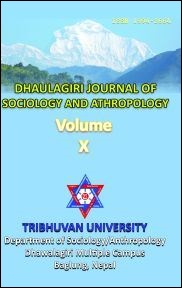Determinants of Community Governance for Effective Basic Service Delivery in Nepal
DOI:
https://doi.org/10.3126/dsaj.v10i0.15885Keywords:
community governance, community-based organisation, determinants, service delivery.Abstract
Community governance is an approach of shift from governmentality to governance. This is more flexible approach extends beyond government, and the place of its agencies, to a greater sharing of power between the state, the market and civil society via new network and partnership structures. This paper analyses the determinants of community governance at the grassroots level in Nepal for the efficient delivery of basic services based on primary data sources. 110 locally constituted community based organisations were selected for an organisational survey. Additionally, three focus group discussions and 40 in-depth interviews were employed for information collection. A multiple linear regression model was used for data analysis, which revealed 12 variables such as Inclusive participation (X1), Empowerment of the people (X2), Transparency and accountability (X3) Enabling environment (X4), Practice of local democracy (X5), Service effectiveness (X6), Service integrity (X7), Social capital development (X8), Institution building (X9), Community mobilisation (X10) Planning, implementation, and monitoring (X11), Coordination, linkage, and partnership (X12) are significantly influencing governance practice. Results indicated a 14 percent variance between dependent and independent variables. This shows the overall practice of governance at the community level was malfunctioned, which can be attributed to a number of factors. First, many community-based organisations (CBOs) do not adopt governance mechanisms in their approach to development. Second, despite a crisis in governance, some CBOs have participated in the service delivery process. Third, this crisis has been a foremost obstacle in the working culture of CBOs. This analysis further explores the problem from the perspective of socio-economic structure, power politics and interests, institutional issues, and capacity and resource constraints.




